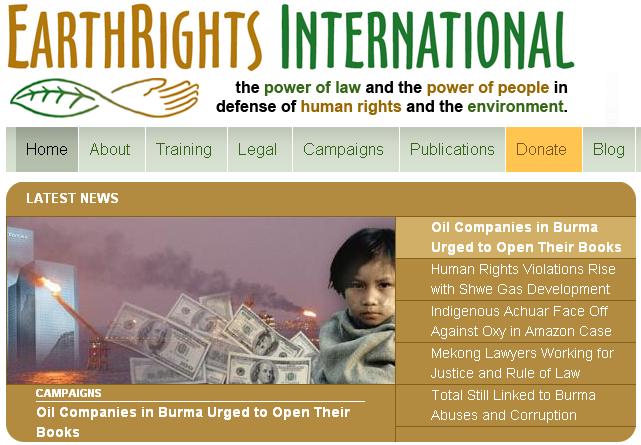Oil Companies In Burma Urged For Financial Transparency

27 April 2010: Foreign oil companies, who partner with Burma’s military regime on the Yadana natural gas pipeline to Thailand, have been urged to reveal the over-18-year payments made to the ruling junta, according to a report released today by Earthrights Interntional.
Over 160 NGOs, labour unions, investment firms, scholars, and policiy leaders, including the former Prime Minister of Norway and the former President of Ireland, called on the oil companies Total, Chevron, and Thailand’s PTTEP to publish ‘comprehensive data and information’ including taxes, fees, royalties, and bonuses paid to Burma’s authorities since 1992.
“Transparency in payments to host states is a minimum element of corporate responsibility in the oil and gas sector,” according to EarthRights International representative Matthew Smith. “There’s no defensible argument against revenue transparency, especially in this context,” Smith added.
While it is common, and very controversial, for oil and gas contracts to be kept strictly confidential, the group revealed today that Total, Chevron, and PTTEP’s contracts with the Burmese authorities are legally public documents, and that the “governing contracts do not prohibit Total, Chevron, or PTTEP from practicing full revenue transparency” in Burma.
“The people of Burma have a right to know the financial details surrounding the country’s natural resources, including payments made by foreign oil companies” said Naing Htoo, an ethnic Karen representative of EarthRights International. “This statement and its broad local and international support are a testament to the importance and need for transparency and accountability in the country,” Htoo added.
EarthRights International is encouraging more endorsements of the two-page statement “until the effort is a success.”
In 2009, EarthRights International estimated that the Yadana gas pipeline had generated over US$7.5 billion in gas sales to Thailand. The organization exposed that a significant portion of the junta’s gas sales were siphoned to bank accounts in Singapore rather than to the fledgling national economy, development, or humanitarian relief. EarthRights International also linked the Yadana pipeline to forced labor, killings, and other human rights violations in the project area.
In 1992, Total signed a production sharing contract with the Myanmar Oil and Gas Enterprise (MOGE) to explore, develop, and market natural gas deposits in Burma’s Andaman Sea. The company is now the principal stakeholder in a consortium including Chevron, PTTEP, and MOGE operating the Yadana (“treasure”) gas pipeline that transports natural gas from Burma to neighboring Thailand.
Preparations for the Yadana pipeline began in the early 1990s and it was officially constructed in Burma from 1996-1999; gas sales to the Petroleum Authority of Thailand (PTT) commenced in 2000 and continue to date. The pipeline project transports natural gas to the Thailand border, from where it feeds into two power plants in Thailand, which in turn provide electricity to the Bangkok metropolitan area. The project is currently one of the single largest sources of revenue for the Burmese authorities.
In October 2009, Total disclosed that its portion of the Yadana natural gas project in Burma generated US$254 million for the Burmese authorities in 2008, according to the report by Earthrights International.
A two-page public statement said: “We the undersigned believe the initial investment in the Yadana gas project in Burma was not advisable for Total, Chevron (formerly Unocal), and PTTEP, given the subsequent, well-documented and widespread human rights violations committed by the Burmese military against the local population. Total, Chevron, and PTTEP should now practice revenue transparency as a core element of corporate responsibility in Burma.”
The oil companies Total, Chevron, and the Petroleum Authority of Thailand Exploration and Production (PTTEP) have an opportunity to promote transparency and accountability in the extractives sector in Burma by becoming the first oil companies to voluntarily publish their payments to the Burmese authorities.
The Earthrights International (ERI) is a non-profit group of activists, organizers, and lawyers with expertise in human rights, the environment, and corporate and government accountability. ERI has offices in the U.S. and Southeast Asia.
Van Biak Thang
[email protected]
Chinland Guardian




